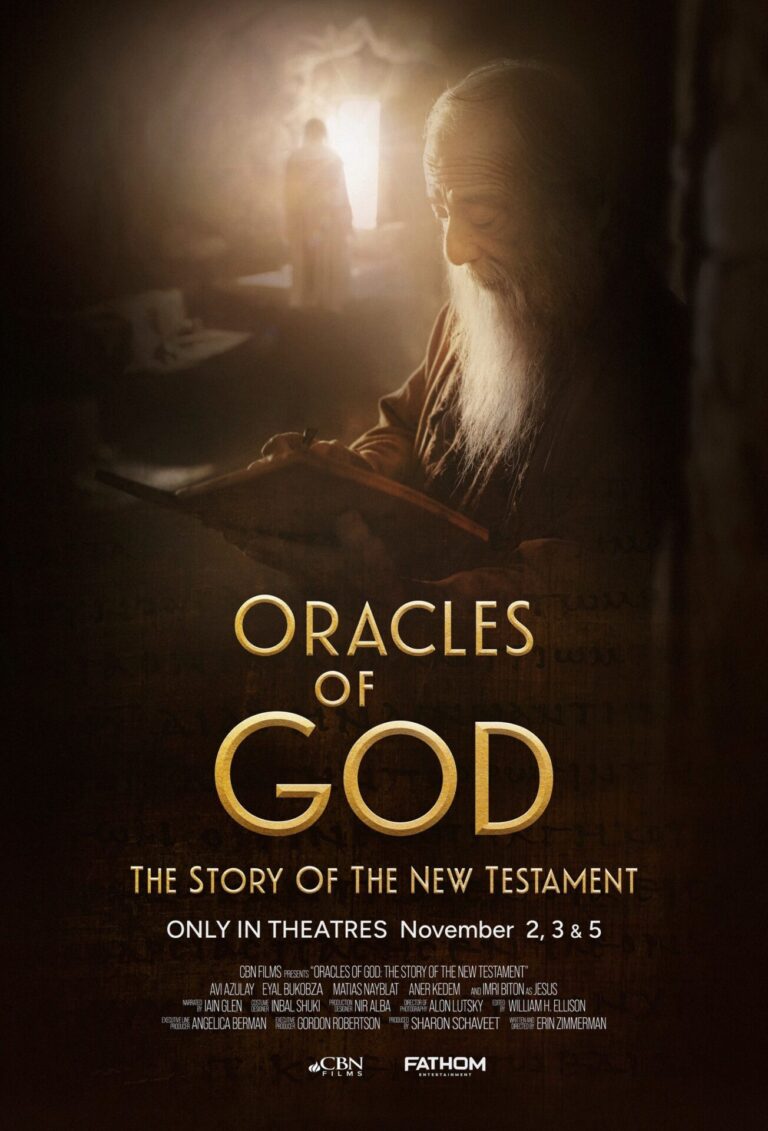“Examining the Word of God Written”

| None | Light | Moderate | Heavy | |
|---|---|---|---|---|
| Language | ||||
| Violence | ||||
| Sex | ||||
| Nudity |
What You Need To Know:
ORACLES OF GOD is a good introductory movie about the creation and dissemination of the New Testament documents. It includes brief re-enactments of parts of the life and teachings of Jesus Christ and His apostles. ORACLES OF GOD features some bloody images of Jesus on the Cross and of His brother, James, after he was thrown off a parapet. Otherwise, the movie is exemplary.
Content:
Very strong Christian, biblical worldview about how the New Testament documents were written and accepted;
No foul language;
Some bloody images of Jesus on the Cross and dying, and some bloody images when Jewish leaders throw His brother, James, off the temple but he survives and the narrator says they then had to stone him to death, plus a mention that Peter was crucified upside down and Paul was beheaded;
No sex;
Some upper male nudity involving crucifixions;
Jesus offers wine to the apostles at the Last Supper, the first commemoration of the Eucharist;
No smoking or drugs; and,
Jewish leaders falsely accuse Jesus of blasphemy at an illegal trial.
More Detail:
ORACLES OF GOD starts by examining the four gospels describing the life, teaching, death, and resurrection of Jesus Christ. Two of the gospel writers, Matthew and John, traveled with Jesus during His ministry. Also, one gospel writer, Mark, knew Peter, a close companion of Jesus, and the fourth, Luke, traveled with Paul and knew the other apostles and many early disciples, including family members of Jesus.
Scholars also discuss Luke’s record of the early church in Acts, including the ministries of Peter and Paul. The remaining documents are the formal epistles or essays and informal letters of the apostles, and the Book of Revelation, a prophetic vision written by John, one of the closest disciples of Jesus.
The scholars interviewed in the movie assert that the first Christian leaders only accepted documents written by the apostles themselves, because they actually knew Jesus personally and met the resurrected Jesus. Paul, of course, met the resurrected Jesus at least twice according to the Book of Acts, and Paul implies in his writings that he also received direct instruction from Jesus. The gospels of Luke and Mark also were accepted because they received teaching from two apostles, Paul and Peter, respectively. Luke and Mark also knew the other apostles, and Mark traveled for a time with Paul.
The rest of the New Testament documents were accepted because the early church accepted a Scripture the writings of the apostles and the two epistles written by James and Jude. James and Jude were in the room with the apostles and their mother, Mary, when Jesus physically appeared to them after leaving the Empty Tomb. James was the Bishop of Jerusalem until he was martyred in 62 or 69 A.D.
Another criteria among the early Christian churches was if the writing coincided with the other authoritative books and writings. If it contradicted a major point, it was suspect.
The scholars in ORACLES OF GOD also discuss the languages in which the New Testament documents were written and how they were delivered to churches and people in the First Century. For example, they note that the first woman chosen to be a Deacon in the early church was a woman named Phoebe, a rich patron of Paul’s. Paul chose Phoebe to deliver his letter to the Romans between 56 and 58 A.D. The movie says that, except for the Book of Revelation, the New Testament documents were written between 48 and 70 A.D. However, other scholars assert that even REVELATION was written before 70 A.D.
ORACLES OF GOD is a good introductory movie about the creation and dissemination of the New Testament documents. It includes brief re-enactments of parts of the life and teachings of Jesus Christ and His apostles. There are also scenes of Jesus dying on the Cross, and two scenes of the resurrected Jesus talking to the Apostle Thomas and the Apostle John. Thus, ORACLES OF GOD features some bloody images of Jesus on the Cross and of His brother, James, after some Jewish leaders threw James off a temple parapet. Otherwise, the movie is exemplary.
It should be noted that, in looking at the authoritative nature of the 27 New Testament documents, Christian scholars examine the preponderance of the empirical evidence, including the historical evidence. Absolute 100% confidence is difficult to come by, but not necessarily impossible.


 - Content:
- Content: 

